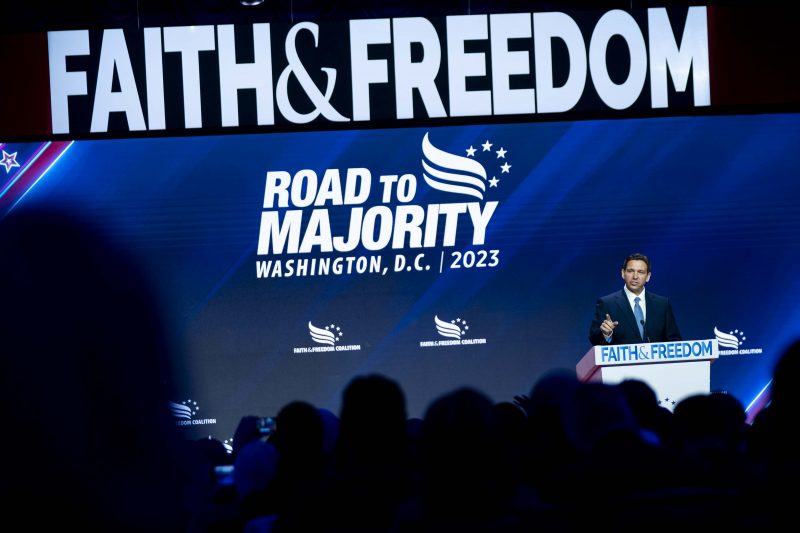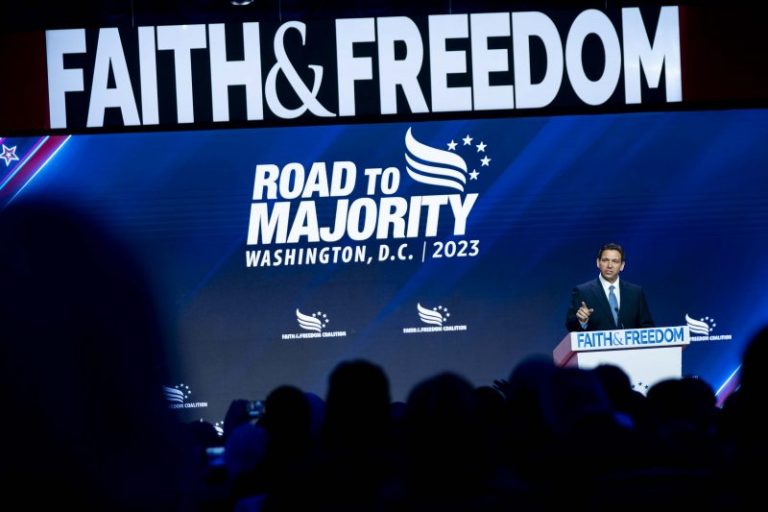
Several candidates for the GOP nomination took the stage to court Christian conservatives in a hotel ballroom in Washington on Friday, touting their commitment to limiting abortion rights, while some lawmakers and activists urged them to endorse a 15-week ban on the procedure nationwide.
Roughly a mile away, President Biden, Vice President Harris and their spouses appeared jointly to condemn the recent rollback of abortion rights and signal their intention to put the issue front and center in the 2024 campaign.
The split-screen highlighted the country’s stark political divide over abortion on the eve of the first anniversary of the Supreme Court’s decision to overturn Roe v. Wade. Democrats, emboldened by a midterm election in which many voters were galvanized to vote for their candidates, are eying a similar playbook this cycle. Republicans, still reeling from those losses and confronting divisions about the path forward, are facing renewed pressure from their base to embrace tighter restrictions, even as some in the party are wary of the potential fallout in a general election.
The stakes were evident at the Faith and Freedom Road to Majority Conference, where several GOP presidential candidates touted their positions on abortion and in some cases jockeyed to get to the right of their rivals. The Republicans also sought to flip the argument on Democrats, by forcing them to define whether they favor restrictions on abortion at any point in pregnancy.
Former vice president Mike Pence called on every GOP candidate to back a federal ban on abortion after 15 weeks of pregnancy and, in a not-so-subtle dig at former president Donald Trump, said that “others” have suggested “continuing the fight to life could produce state legislation that’s too harsh.”
Florida Gov. Ron DeSantis (R) said his state is “promoting a culture of life” and touted the six-week abortion ban he signed this year. “It was the right thing to do,” DeSantis told the crowd. “Don’t let anyone tell you it wasn’t.”
Sen. Tim Scott (R-S.C.) said that “we are creating a culture of life in America.” Scott has said he would support a 15-week abortion ban and has vowed to sign the “most conservative pro-life legislation” if elected to the White House. In a televised interview this year, he was more evasive on the question, illustrating the less-than-comfortable posture some Republicans have shown on the issue since Roe was overturned.
The other senator from South Carolina, Republican Lindsey O. Graham, a Trump backer, has been leading a charge for a 15-week abortion ban.
“Everything we’ve fought for — for 50 years is at risk,” Graham said Friday in a speech at the conference. “We should be happy a year later that finally, after 50 years we got Roe v. Wade off the books. But I’m telling you right now, the war, the fight is not over … Our Democratic friends would make this the most radical place on the planet when it comes to the life issue.”
Meanwhile, Trump, who has billed himself as “the most pro-life president in history,” is set to speak Saturday evening. Trump has demurred when asked whether he would commit to a 15-week abortion ban, only suggesting that the overturn of Roe has allowed for a negotiation on a federal bill.
Former U.N. ambassador Nikki Haley, the only woman in the GOP 2024 field, has sought to position herself as a standout messenger on abortion capable of forging compromise, and she will also speak Saturday. Haley has offered few specifics on the issue, stating that she wants to “save as many babies and help as many moms as possible.” She has also said she believes there is a role for the federal government on abortion but has not said what that is.
Abortion wasn’t the sole focus of candidate speeches, which also covered parental rights, gender-affirming care for transgender youth, “woke” culture and support for Israel. In the wake of the Dobbs v. Jackson Women’s Health Organization decision, which overturned Roe, Republicans have struggled to coalesce around a single message, with some suggesting it should be left to the states and others pushing for Congress to go further and pass a national ban. Yet some Republicans acknowledge the tough political reality of passing a national ban, given that it would require full GOP control of Washington and 60 votes in the Senate.
A recent Gallup poll found that a record-high 69 percent of Americans believe abortion should be legal the first three months of pregnancy. That same poll found that 37 percent of Americans support abortion in the second three months of pregnancy and 22 percent support it in last three months of pregnancy.
Democrats see public opinion as being squarely on their side, especially after midterm elections that did not produce an anticipated “red wave” last year and where voters in red states like Kentucky and Kansas voted down antiabortion amendments.
Now, as he makes the case for his own reelection, Biden is aiming to show his base that he is committed to fighting for abortion rights, aides said. He has pledged to sign a bill codifying the protections of Roe if elected to a second term, and said that, in the meantime, he would use the levers of presidential power to protect the right to an abortion.
“We can restore the protections of Roe v. Wade and make it the law of the land again. But we’re going to need your help badly,” Biden told supporters of abortion rights during a rally Friday. “The court got Roe right 50 years ago, and I believe Congress should restore the protections of Roe v. Wade once and for all.”
Hours earlier, Biden signed an executive order directing several agencies to consider new actions to improve access to contraception. During his speech, Biden acknowledged that he is being forced to sign executive orders on reproductive health because Democrats lack the political power to pass legislation in Congress. With most legislation needing 60 votes to pass the Senate, the pathway to a national law legalizing abortion seems narrow, even if Biden were to win reelection.
“I know I’m 198 years old, but all kidding aside … I never, ever thought I’d be signing an executive order protecting the right to contraception,” Biden quipped while addressing members of abortion rights groups.
Three of those groups, Emily’s List, NARAL Pro-Choice America and Planned Parenthood Action Fund, endorsed Biden and Harris for reelection on Friday. Biden’s reelection campaign hailed the endorsements as a sign of his political strength among Democrats as he tries to win a second term.
“Since the Dobbs decision last summer, we have seen the horrifying impact that the extreme MAGA agenda has on women’s health,” Biden-Harris campaign manager Julie Chavez Rodriguez said Friday in a statement, using the acronym for Trump’s “Make America Great Again” slogan. “MAGA Republicans’ promising a national abortion ban makes reelecting President Biden and Vice President Harris all the more important.”
Abortion remains a key issue for White evangelical voters, who will wield enormous influence in the GOP primaries and have pushed for restrictions in the post-Roe landscape. While many credit Trump with the appointment of Supreme Court justices who helped overturn Roe, his Republican opponents have questioned his commitment to the issue and his suggestion that abortion played a major role in Republican losses during the 2022 midterms.
Former Arkansas governor Asa Hutchinson, a long-shot GOP candidate for president, sharply rebutted that contention, placing the blame for a disappointing 2022 cycle squarely on Trump.
“I think we lost control of the Senate in the last election cycle, because Donald Trump engaged in it and … focused on the past instead of the future,” Hutchinson told reporters after his speech at the Faith and Freedom Coalition gathering.
He added, “I would put it on Donald Trump and no other issue.”
Underlining the GOP’s conundrum, even the calls for a federal ban at 15 weeks of pregnancy did not go far enough for some in the crowd. Corey Check, a 21-year-old Republican attendee from Butler County, Pa., who supports Trump, said the party should embrace limits on abortion at “zero weeks,” adding that there should be exceptions for rape, incest and the life of the pregnant person.
Check said he believes there hasn’t been a consensus on abortion restrictions within the GOP, because “the party is pro-life, period” and that it hasn’t been the top concern recently.


Comments are closed.